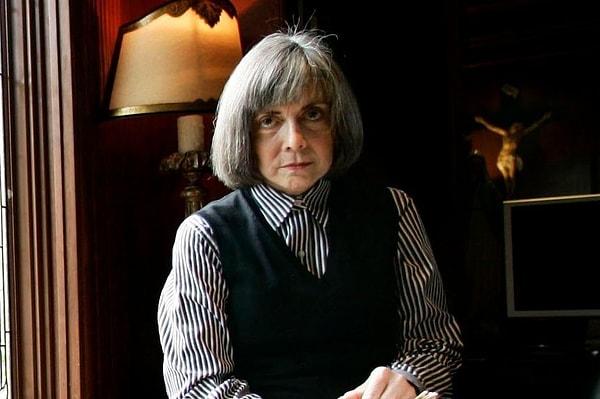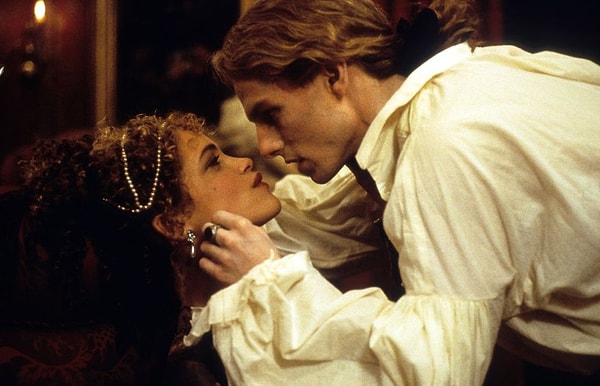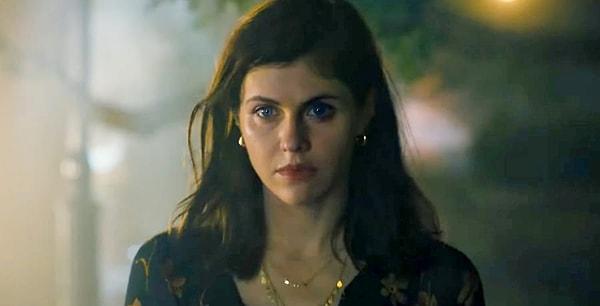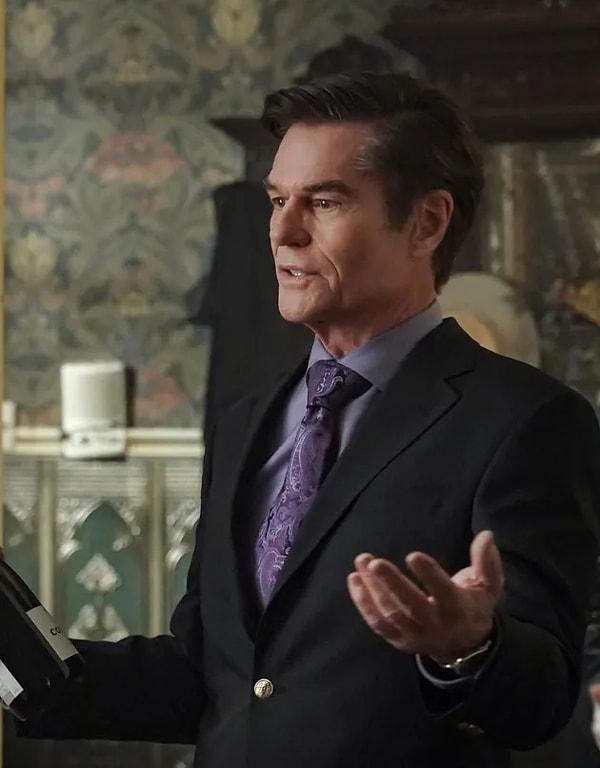Mayfair Witches and the Problem With Adapting Anne Rice's Work
Anne Rice's feuds with Hollywood are the stuff of legends. She spent more than 20 years negotiating with various directors and production companies, writing scripts, and contacting leads, all so she could create the perfect adaptation of Interview with the Vampire. Contrary to popular opinion, she was determined to make the project work. She was a huge fan of film, and she wanted to see her books come to life.
Many changes were made, most of which she claimed to be her own idea. She thought of diluting the film, cutting out the homoeroticism, and toning down the gore factor. This was a concern for some. The audiences were bound to catch on to the not-so-subtle chemistry between Louis and Lestat, and they were living in a deeply homophobic time. There was also the problem of moral relativism. Lestat is the star of the Vampire Chronicles, not Louis, and he thoroughly enjoyed every second of the hunt. The man was pure evil.
This did come up when the film was made. Oprah famously walked out of a Los Angeles screening, saying that it was simply too dark for her. She was one of 30 others present who decided to leave. This was just one of countless issues surrounding the production. The biggest problem, of course, was Anne Rice's infamous campaign against Tom Cruise who had been chosen to play Lestat.

Courtesy of Lenny Ignelzi/AP
Tom Cruise has since managed to repulse every sane human being who has ever laid eyes on him. He's imbalanced, childish, and if the rumors are to be believed, he's dangerous. But in the early 90s, he had a squeaky clean public image and a white-washed persona. It was exactly the opposite of Lestat's portrayal in the books. So when it got out that he had taken on the role, people had a lot to say about it. Fans revolted. Anne Rice spoke out.
She hated Tom Cruise. She said he was too short. He didn't have the right look. His voice was too high. These criticisms kept coming and coming. It's been said that she was ruthless, and she did hurt Tom's feelings. He called her venomous. But it wasn't just Anne Rice.
There's a reason the author is seen as a cultural icon. She didn't introduce modern gothic fashion into the public arena, and she certainly wasn't the only one to write about vampires, bur she had a distinct style. There were crushed velvet suits, candelabras, and paisley walls--all host to an unchecked buffet of animalistic desire. It spoke to a different kind of crowd, one that preferred mohawks to buzzcuts, and black makeup to red rouge and lipstick. They were outcasts and miscreants, hated by the world, and relegated to life's backburner. They would gather around libraries and conference halls, skateboards and books in hand, screaming, 'No Tom Cruise! No Tom Cruise!' Rice claimed that they were the ones to start the campaign against him and she was simply rallying around them. But those involved with production were not convinced. They saw her book sales spike, the headlines, and the author at the head of pack, holding speaking engagements and signings. Many believed that she was doing this intentionally for fanfare. Whether or not that was the case remains to be seen. But it's exactly the kind of reaction studios fight to avoid. It's their worst nightmare.

Courtesy of Warner Bros
Why We'll Never See a Faithful Adaptation
In the end, Anne Rice loved the film. She thought Tom Cruise did an extraordinary job. He was just as arrogant and flamboyant as Lestat. He had the style that everyone needed from the character, but the damage had been done. She had pissed off everyone involved. Brad Pitt wasn't willing to continue. There were unconfirmed rumors that Cruise felt the same way, so she had to look elsewhere if she wanted to see the rest of her books on screen. What followed was an epic saga of failure, bad contracts, rights deals, and ultimately, Queen of the Damned, a heretical parody of one of her greatest works.
She never gave up on having her books adapted. On her website, she claimed that her agent was constantly reaching out, hoping to make a deal. But she had earned a reputation for being difficult, and her writing style presented serious obstacles to anyone willing to take her projects on.
God love her, she knew how to spin a tale, and her rich velvety tone is like literary heroin. It's addictive and alluring, the product of years of hard work and meticulous care. She took the time to make sure that we could not only envision her novels, but also feel them. In order to accomplish that, she was forced to interrupt the flow of the narrative.

Courtesy of AMC+
The first book in the Live of the Mayfair Witches, Witching Hour, was a perfect example of this. In the second chapter, we travel from San Francisco to New Orleans, moving from a sickbed to a hospital and then to the character's family home. Sometimes the switch would be almost imperceptible, forcing the reader to catch their bearings, backtrack a few sentences, and try to keep track of all of the different settings and timelines. It was compelling and very entertaining. She didn't create characters; she created people--flawed, but extraordinary. They jumped off the page to speak to us.
Hollywood prefers continuity. Flashbacks are of course a major tool in film. They help filmmakers sum up lengthy backstories and delve into side plots. But if they're overused, they tend to knock the audience out of the trance that keeps them interested in the plot. If we're constantly moving back and forth instead of focusing on the narrative, we might get restless and tired of all of the traveling. If we stick to the suspense and beauty of the present, we're more likely to become involved in the story.
Flow can also refer to the rhythm of the prose--the beat, composed of syllables and punctuation. There are a few exceptions, but normally it's meant to keep our eyes drifting down the page, moving from one word to the next. Writers spend their time learning to sense this dance. They'll get to the point where they can feel it instinctively. Anne Rice was capable of making her words flow, but she was the queen of interruptions. She'd compose three perfect sentences and build a sense of anticipation, then switch things up, often for the sake of descriptive detail. Her editors must've had a serious problem with it because everything we write is designed around this rhythm. Change one word, and you have to change the rest.

Courtesy of AMC+
Filmmakers don't need their words to flow on a page. But her style is a perfect example of the one of the biggest reasons why she was unable to get her work adapted in its entirety. How do you write a coherent scene when your characters are skipping around? In the series, we could spend three seconds looking at Michael's gloved hands in Mayfair, another three seconds in the Irish channel, and a moment watching him drown. These are kinks that can be worked out. It's been done. But it is a hassle, and she often stepped out of the scene format, preferring instead to stick with inner monologue and exposition. No filmmaker is going to have a narrator go on for 20 minutes. It's not the way they do things.
The length also posed a serious problem. The Witching Hour is well over three hundred thousand words--a hundred thousand more than JK Rowling's final installment in the Harry Potter series, and it was filled with lore. Fans are known for creating Mayfair family trees, piecing together the countless clues mentioned within the text. Some of the information was integral to the plot. It couldn't be separated from the work without making major alterations.
Many fans have commented on their omission of Aaron Lightner and Michael from Mayfair Witches, but a lot of people weren't surprised at all. There's simply too much, and if they did try to take on the full breadth of her work, they would have to worry about pacing. TV series are known to consistently drop in popularity as time goes by, and the first book alone could've spanned several seasons. They would not have been able to maintain the numbers they'd need to justify funding the entire franchise, and they wouldn't have been able to bring the story to a proper conclusion.

Courtesy of AMC+
The biggest problem with Anne Rice's work was the format. All of the things that happened in her books were allowed onscreen, even the homoeroticism. It had been done before. But she didn't write using the basic narrative structure. We're used to basic conflicts, climaxes, and resolutions. The books most of us are familiar with are centered around events. Her novels were centered around the lives of her characters. She was a biographer weaving together individual anecdotes to give us a glimpse into their lives, not a storyteller building towards a final battle.
Biographical films are of course not unheard of. Sometimes they are just a collection of anecdotes. But they've waned quite a bit in popularity over the years, and they are still altered to fit that narrative structure.
This was not the case with Mayfair Witches. There was a clear beginning, middle, and an end--a big reveal, a battle. It was all there. But it took a month's worth of reading material to get to that point, and it was still largely a biography about the women. Hollywood was never going to leave that alone.

Courtesy of AMC+
The Unholy Canon
A faithful adaptation of the Lives of the Mayfair Witches--if such a thing were possible--would have been canceled before they could even finish the first book. But Anne Rice's fandom is very particular, almost as much as the author herself. Everything about her work, from the dialogue to her unique style, is sacred ground. They believe in canon, and in many ways, so did Anne. She was adamant that everyone working on her projects needed to be familiar with the source material, the tone, and the tiny details--things that are so often missed when books are translated into film. She wanted to recapture the magic, not alter it.
With the exception of the main lead, Alexandra Daddario, nobody in the cast read the books. Alexandra herself admitted that she read the first one, but they had already commenced filming when she started. At this very moment, Anne Rice is writhing in her casket, struggling to claw her way out, and that's not the only reason. Fans of the novels have been quick to point out the changes to Alexandra's character, Rowan. Her hair color is wrong. Her personality is wrong. Even her last name, Mayfair, was changed.
The scenes themselves do succeed at capturing the Mayfair aesthetic. The house looks like the house in the novels. New Orleans is every bit as strange and esoteric as we need it to be. But the events have been altered beyond recognition. It's not the same story. That is a serious disappointment for the purists who make up a large portion of the franchise's fanbase.

Courtesy of AMC+
Old school fans are never going to accept AMC's new series. It violates everything they look for in an adaptation, and we can be certain that Anne Rice would feel the same way. That may or may not be because of the quality of the production. It does have its issues. But it's also because of the nature of the source material.
AMC+ knew all of this. Anne Rice's attitude and her history with the industry are widely known. The same can be said of the fandom. So they must've been hoping for broad appeal--something that everyone could like, instead of a series geared towards purists. If that was the case, they failed spectacularly.
At the time of writing this, the series has a 43% on Rotten Tomatoes. It's been universally panned by critics who are calling it a cheap, diluted parody of a classic. Fans have been speaking out left and right. Some are willing to keep going, even though they know it's a divergence from the source material, while others hate it so much that they can't even stand to watch it. That says a lot. Many of them idolize Anne Rice. They treasure the books. They study them. They pass them down to their children. How could they not watch the show? With this level of repulsion, it's almost impossible to imagine the series taking hold. But it's still too early to tell.
Keşfet ile ziyaret ettiğin tüm kategorileri tek akışta gör!

Send Comment